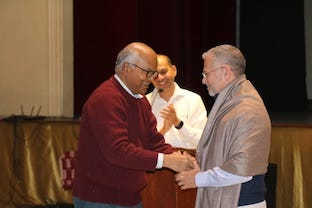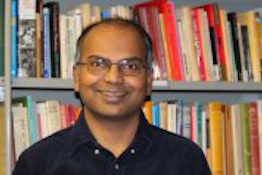Author reflects on Christian-Muslim marriage

Helene Ijaz PhD
Helene Ijaz PhD, is an educator, mediator, and consultant in cross-cultural, interracial, and interfaith relations. She's the author of 'Your Heart Knows the Way: A Guide to Christian-Muslim Marriage'. A Roman Catholic Christian, she has been married to a Muslim for over fifty years. In her conversation with Joseph Victor Edwin SJ, she shares the graces and challenges of interfaith marriages that involves Christian and Muslim partners.
1. In your book 'Your Heart Knows the Way: A Guide to Christian-Muslim Marriage,' you explore the significance of interfaith marriage in the Western world. Could you share insights on the book's relevance in the context of Western society?
Helene Ijaz - As a result of globalization, there has been a shift in the population of many Western countries from culturally, religiously, and racially largely homogenous societies to multicultural, multireligious, and multiracial societies. This has created greater opportunities for people from different religions and cultures to interact, get to know each other, and intermarry. Some people have become more open to and accepting of religious and cultural diversity and intermarriage. However, others continue to adhere to exclusivist religion and ethnocentrism. They view interfaith marriage as a threat to their religion and cultural identity. Christian-Muslim marriages are widely frowned upon due to the long-standing adversarial relationship between the two faith communities. Stereotypes about Muslims abound and are constantly fueled by events at a local, national, and international level. Religious leaders in Christianity and Islam discourage interreligious marriage out of concern about the long-term effect on the faith life of members of their religion. Many Muslim immigrants to the West discourage their children from marrying outside their faith for fear of losing their identity, including their language, culture, and religion. These social dynamics create much pressure and tension for interfaith couples.
The book analyzes various religious and social factors that can impact a Christian-Muslim marriage, their sources, and ways of addressing them. It argues that emphasizing human differences creates division and conflict among people. By opening ourselves to people different from us and learning about their values, beliefs, practices, and traditions we become enriched and grow as a human being.
2. Living in an interfaith context can significantly influence one's faith response to the revelation in Christ. How has this shaped your faith as part of an interfaith family?
Helene Ijaz - Living in a Christian-Muslim family has shifted my focus from unquestioning obedience to Church teachings about Jesus and related religious precepts and practices to seeking to live by the spiritual teachings of Jesus: his message of God's love for all of God's creation, including all human beings, regardless of religion, ethnicity, gender, and social status; his calling us to search for a deeper awareness and understanding of God's ways and thereby grow as human beings; his focus on human relationships instead of religious laws, and mutual love and respect, compassion, fairness, and justice, and mercy and forgiveness as guiding principles. I have discovered similar teachings in the Qur'an and its call to surrender to God and recognize there is no compulsion in religion (2:256). I believe God is greater than any one religion. The goal of religion is to help us grow and become transformed into the human beings we are meant to be. The exclusivist approach to religion in much of mainstream Christianity and Islam conflicts with core spiritual teachings by Jesus and the Qur'an. It is profoundly divisive and has a particularly negative impact on interfaith couples
3. What would you identify as critical elements contributing to a successful interfaith marriage?
Helene Ijaz - Critical elements contributing to a successful interfaith marriage include a couple's mutual love and respect, the equitable treatment of their religions, and a shared focus on God. Spouses must be authentic in their faith, open to otherness, and willing to learn about, respect, and honour each other's faith traditions. Their relationship needs to be internally not externally driven. It is important for both sides to critically reflect on the implications of the religious rules on intermarriage in their own and each other's faith community and how they can maintain religious integrity, given potential pressures by their partner to surrender their faith and engage in a false conversion.
To build a harmonious relationship, husband and wife must feel free to be and grow as who they are. At the same time, they must find a fit between their different ways of seeing and experiencing the world and their different religious beliefs and practices. This is often not easy. A couple can build mutual understanding and trust through effective communication. Cooperation and joint problem-solving promote a strong partnership and bring issues out in the open before they seriously affect the relationship. For an interfaith couple to effectively communicate entails moving back and forth between their own world and their partner's world and actively engaging with each other's beliefs, practices, and experiences.
Different rules, norms, and social practices in the faith traditions of husband and wife can affect a couple's daily life. If one partner insists that theirs is the only right way and must be followed, this can lead to tension and conflict. To build a loving, harmonious relationship, spouses must distinguish between what is essential and nonessential to the practice of their faith, balance each other's religious requirements and needs, and be willing to compromise on nonessential issues. The many spiritual values shared across Christianity and Islam can provide a source of unity for husband and wife.
4. In a society where family structures are increasingly vulnerable, how can interfaith families serve as a refuge that upholds faith values?
Helene Ijaz - There are many reasons for vulnerable family structures. Loss of faith is one of them. Christian-Muslim families are highly vulnerable to encountering problems due to their religious and often also cultural and racial differences, the long-standing adversarial relationship between their faith communities, and gender-related inequities. Family members may experience societal bias, prejudice, or discrimination, including by some extended family, or one spouse may fail to effectively respond to the other's physical, emotional, or spiritual needs or those of other family members. Raising children in a Christian-Muslim marriage poses particular challenges, especially if one or both parents - following religious prescriptions - insist that their religion is the only right one and that their children should be raised in it.
My experience suggests that interfaith couples that succeed in effectively managing their many challenges rely primarily on principles such as mutual love and respect, the fair, equitable, compassionate, and caring treatment of everyone involved, and paying due attention to their needs and aspirations, regardless of the faith tradition to which they belong. Foundational to a religiously and spiritually informed life, these principles reflect universal human values that positively impact any relationship. They transcend dualistic thinking and any effort to promote oneself or assert one's superiority. They show openness to and affirm and honor otherness while acknowledging the interconnectedness and interdependence of all human beings and striving for unity, balance, peace, and harmony. Such an approach may well serve as a model for other families with vulnerable family structures.
5. In the context of a Christian-Muslim family, what practical steps can one undertake to discern the will of God?
Helene Ijaz - To discern the will of God means to acknowledge and surrender to a power greater than ourselves, the source of everything that is, and seek to abide by its precepts as imprinted on our hearts. Both Christians and Muslims share this concept of the will of God. Jesus described the key elements of what represents the will of God by saying: "Love the Lord your God with all your heart and with all your soul and with all your mind…, "Love your neighbor as yourself," (Mt 22:37) and "Do to others as you want to have them do to you." (Mt 7:12). " Essentially, discerning God's will entails distinguishing between good and evil, right and wrong, and what is good for or harms other people and ourselves. The right course of action reveals itself through our conscience, the voice of our heart.
As children, most of us learned and internalized basic moral values as part of our religious upbringing. But if these values are to provide effective guidance in all life situations, we must deepen our awareness and understanding of how we can uncover what may be God's will. To discern what course of action God may want us to take in a given situation we must listen to our heart, the link between us, God, and others. We must become attuned to how God speaks to us. As we listen deeply to our inner self, we may gradually intuit the right path. We may also become aware of external clues as to the direction God may want us to pursue.
Uncovering God's will requires effort. Private prayer, meditation, and reflecting on the tasks and challenges before us can deepen our understanding of the intentions and motivations behind our actions and potential implications for others and ourselves. We can also explore the rationale for and impact of different options by discussing them with our partner and other family members. We can seek to live by moral values and spiritual principles as a family by addressing issues and situations where someone has chosen the wrong path and analyzing ways of remedying it. We can pray or fast together as a family to purify our hearts. Self-examination at the end of the day can help us monitor and grow in our ability to discern the will of God. As parents, we can help shape our children's conscience by discussing the values behind moral actions, encouraging them to explore what drives their actions and their impact on others and themselves, and modelling the right action to them.
LINKS
'Your Heart Knows the Way: A Guide to Christian-Muslim Marriage': www.amazon.in/Your-Heart-Knows-Way-Christian-Muslim/dp/0228867185
Muslim & Christian experts discuss guidelines for Interreligious Marriage: www.indcatholicnews.com/news/22070


















